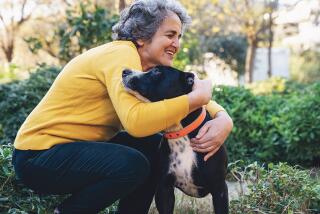Pets Owners Need to Be on Guard : Risks of Animals Transmitting Diseases a Serious Matter
- Share via
Best friends. That’s the way a Baltimore woman described her pint-size terrier, who greeted her each morning with tail wagging. He slept curled on the pillow next to her own--until the day last month when she found ticks on her arm, her linens and her dog.
“I was in a panic,” she says. “All those warnings you hear about diseases. I never worried about it before, but I was upset.” So upset she gave the dog a repellent dip and banished him from the bedroom for the rest of the summer tick season.
The likelihood of an animal sharing a bug that can transmit disease --or directly giving bacteria or parasites to a human--is relatively low. But cases occur across the country. The risks of getting roundworm, toxoplasmosis, rabies and other animal-related illnesses must be taken seriously, say infectious disease specialists.
In a society in which animals are treated as family members, it’s only logical. Husbands and wives share colds. Children give chicken pox and measles to siblings.
Similar Symptoms
Pets can also carry home diseases. To be sure, the majority of animal-transmitted sicknesses cause little more than discomfort. Misdiagnoses often occur because the symptoms are similar to so many other ailments: fever, nausea, diarrhea, aches, rashes, sweats or chills and flu-like reactions. Untreated, however, some bacterial and parasitic ailments escalate to debilitation and even death. Advising the family physician or emergency room that you’ve been bitten or scratched, therefore, can make the difference.
Doctors stress that for the majority of pet owners who have strong immune systems, owning an animal can be beneficial as well as safe. The problem is one of awareness, says Dr. Peter Schantz, an epidemiologist and veterinarian at the Centers for Disease Control in Atlanta. Most pet owners don’t realize that they can take simple precautions against catching their pets’ diseases.
Failing to keep the pet’s living area clean; feeding with raw, undercooked or spoiled meats; forgetting to wash hands after contact with the pet; allowing the animal to run free in areas where wildlife or strays roam--these are health-risk behaviors of humans. Ignoring routine veterinary care such as worming and vaccinations is like opening the front door and inviting disease in.
“I have dogs and cats, and I have kids, and I feel that it’s very easy to have pets and reduce the risks,” Schantz says. “The infectious disease risks associated with pets are not that severe that they counterbalance the recognized values of owning pets.”
Americans, by and large, agree. Our love affair with pets grows annually. About 52.4 million dogs live in about 34.7 million households--about 1.5 pooches to each household. The cat population is even larger: 54.6 million, or about two cats to each household. Celebrities like pop singer Michael Jackson, a giraffe and chimpanzee owner, make exotic creatures “status” pets.
Inconveniences Outweighed
With all these pets, responsibilities and risks tug at the owner’s end of the leash. Lloyd H. Ross, chief of Baltimore’s animal control bureau, an arm of the city Health Department, says the public health benefits of leash and pooper-scooper laws outweigh their perceived inconveniences.
When pets foul parks, yards, playgrounds and sandboxes, parasites can be left in the soil or sand, he says. Uncontrolled animals also pose the risks of bites and scratches, which can be traumas in themselves.
The health risks can be reduced with responsible pet ownership.
“It’s the neglected pet that could conceivably be a health concern,” says Dr. Jack Grigor, chief of Maryland’s Center for Veterinary Public Health. “I think a healthy pet is a safe pet.”
His office works to safeguard human health--not just animal health. Throughout history, veterinarians have had crucial roles in detecting zoonoses (zoh-oh-no-ses), diseases transmitted from animals to humans. In some Western states, vets are working to halt bubonic plague transmitted by fleas, the medieval world’s black death, which still exists. They helped rope in tuberculosis, once widely spread by infected livestock and now nearly eradicated in the United States.
For pet owners, history can be a lesson: The vet as well as the physician, the control of the pet’s habitat and sanitation and hygiene protect not only the pet, but the entire family.
More to Read
Sign up for Essential California
The most important California stories and recommendations in your inbox every morning.
You may occasionally receive promotional content from the Los Angeles Times.













